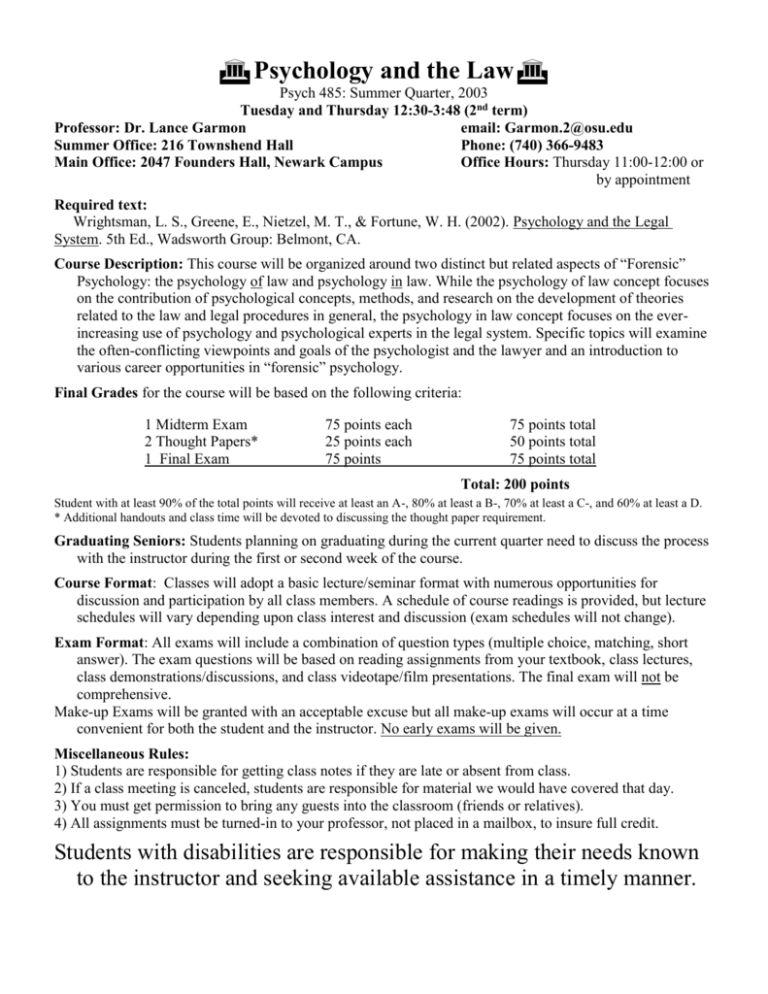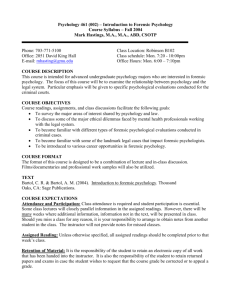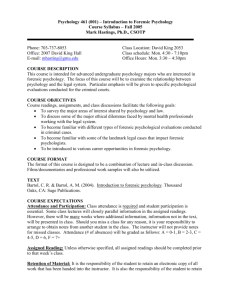Psychology and the Law
advertisement

Psychology and the Law Psych 485: Summer Quarter, 2003 Tuesday and Thursday 12:30-3:48 (2nd term) Professor: Dr. Lance Garmon email: Garmon.2@osu.edu Summer Office: 216 Townshend Hall Phone: (740) 366-9483 Main Office: 2047 Founders Hall, Newark Campus Office Hours: Thursday 11:00-12:00 or by appointment Required text: Wrightsman, L. S., Greene, E., Nietzel, M. T., & Fortune, W. H. (2002). Psychology and the Legal System. 5th Ed., Wadsworth Group: Belmont, CA. Course Description: This course will be organized around two distinct but related aspects of “Forensic” Psychology: the psychology of law and psychology in law. While the psychology of law concept focuses on the contribution of psychological concepts, methods, and research on the development of theories related to the law and legal procedures in general, the psychology in law concept focuses on the everincreasing use of psychology and psychological experts in the legal system. Specific topics will examine the often-conflicting viewpoints and goals of the psychologist and the lawyer and an introduction to various career opportunities in “forensic” psychology. Final Grades for the course will be based on the following criteria: 1 Midterm Exam 2 Thought Papers* 1 Final Exam 75 points each 25 points each 75 points 75 points total 50 points total 75 points total Total: 200 points Student with at least 90% of the total points will receive at least an A-, 80% at least a B-, 70% at least a C-, and 60% at least a D. * Additional handouts and class time will be devoted to discussing the thought paper requirement. Graduating Seniors: Students planning on graduating during the current quarter need to discuss the process with the instructor during the first or second week of the course. Course Format: Classes will adopt a basic lecture/seminar format with numerous opportunities for discussion and participation by all class members. A schedule of course readings is provided, but lecture schedules will vary depending upon class interest and discussion (exam schedules will not change). Exam Format: All exams will include a combination of question types (multiple choice, matching, short answer). The exam questions will be based on reading assignments from your textbook, class lectures, class demonstrations/discussions, and class videotape/film presentations. The final exam will not be comprehensive. Make-up Exams will be granted with an acceptable excuse but all make-up exams will occur at a time convenient for both the student and the instructor. No early exams will be given. Miscellaneous Rules: 1) Students are responsible for getting class notes if they are late or absent from class. 2) If a class meeting is canceled, students are responsible for material we would have covered that day. 3) You must get permission to bring any guests into the classroom (friends or relatives). 4) All assignments must be turned-in to your professor, not placed in a mailbox, to insure full credit. Students with disabilities are responsible for making their needs known to the instructor and seeking available assistance in a timely manner. “Class Schedule” Class Meeting CHAPTER TOPIC 7/29 Syllabus/ Psychology and the Law: Impossible Choices- Ch 1/ Psychologists and the Legal System - Ch 2 7/31 Legality, Morality, and Justice- Ch 3/ Legal System and Its Players - Ch 4 8/5 Theories of Crime - Ch 5/ The Police and the Criminal Justice System - Ch 6 8/7 Crime Investigation: Eyewitnesses - Ch 7/ Identification & Evaluation of Criminal Suspects - Ch 8 8/12 Midterm Exam / Thought Paper 1 Due/ The Rights of Victims and the Rights of the Accused- Ch 9 8/14 Between Arrest and Trial - Ch 10/ Forensic Assessment in Criminal Cases: Competence and Insanity- Ch 11 8/19 Forensic Assessment in Civil Cases - Ch 12/ The Trial Process - Ch 13 8/21 Jury Trials: I. Jury Representativeness and Selection - Ch 14/ Jury Trials: II. Concerns and Reforms - Ch 15 8/26 Thought Paper 2 Due Psychology of Victims - Ch 16/ Punishment and Sentencing - Ch 17 FINAL EXAM Friday, August 29th 1:30-3:18







